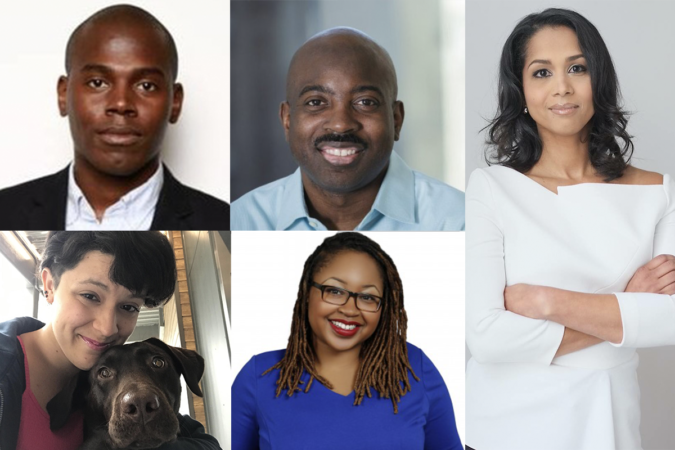The summit provided Black founders with the resources needed to thrive as a start-up in today’s reality
“VCs are still writing checks, even in the middle of COVID,” said Will Lucas, brand manager for AfroTech as he kicked off the Founder’s Huddle Virtual Summit, presented by Amazon Web Services. Entrepreneurs and startup founders tuned in from all over the world last month to learn how to take their businesses to the next level. We’re excited to share a few highlights from the event, so you can get in on the action.
The summit was broken down into two parts, with the first panel, No Code, No Problem: How Non-tech Founders Can Level the Playing Field focusing on no-code app software, and how it can aid founders in building new products. AWS Developer Advocate, Alejandra Quetzalli, and Tara Reed, CEO of Apps Without Code provided tips on how to use non-code tools and services to maximize productivity through customer use cases, while also mentioning the limitations and pitfalls to avoid.
“I would say maybe five years ago if you wanted to build an app you needed to have a computer science degree or know how to code, the code is the thing that makes the app work,” said Reed. “And you needed to know that in order to build an app, or you needed to have a budget of about $20,000 plus to hire somebody to build the app for you.”
In the midst of the pandemic, Reed revealed during the panel that she has seen an uptick in the number of people who have participated in her Apps Without Code training course since many people have had to follow work-at-home mandates and some have been furloughed or laid off. The startup founder believes that one of the greatest impacts she has witnessed with the no-code movement is that it allows people to have the perspective of, “you’re not going to stop me,” and “it allows people to create revenue without getting caught up,” according to Reed.
Here are three pro tips and business goals for non-tech entrepreneurs from Reed:
-
- Build a business that happens to have an app. Make sure you don’t get caught up in the technical details and have a solid business model around the app.
- Research the different no-code tools that will work best for you.
- Charge real money for people to use your app since it’s a product of your business.
The second-panel discussion Secure The Bag: How To Successfully Raise Funds For Your Startup focused on how founders can pitch to VCs who are interested in investing in minority-owned startups to diversify their portfolio. Currently, less than one percent of Black founders receive venture capital funding, and due to the current climate, there is increased interest in investors looking to fund minority-owned businesses.
AWS venture capital business development manager, Jerrod Hill, moderated the fireside chat. The guest speakers were:
-
- William Crowder: Investor, Managing Partner, 42 Venture Partners and Entrepreneur In Residence at Morgan Stanley
- Candice Matthews Brackeen: Investor at General Partner Lightship Capital
Both investors shared their expertise on how founders can effectively raise capital and fundraise. They also got candid about whether VC funds are a great fit for certain companies, the type of information that should (and shouldn’t) be included in the founder’s pitch deck, how to network with investors, and more.
A hot topic for founders is how do VCs go about choosing their investments. Crowder and Brackeen both shared their outlook and the criteria used when choosing viable startups.
“For us, we are looking for companies that already have traction, we don’t make early bets so we don’t invest at the ideation stage or even at the MVP level, we are looking for traction,” said Brackeen. “That’s usually traction by way of users, revenue, or large partnerships. We are looking for a company that’s a little bit further along and a fantastic founder.”
Crowder likes to understand the motivations behind why the founder started the business. He wants to know who he’s going to be working with so that he can learn how to be the most helpful while learning from the relationship himself too.
“Yes, the team is important and the market is important,” said Crowder. “But I also spend quite a bit of time trying to understand the motivations of the founders. I really want to understand who I’m going to be working with for the next several years and what they bring to the table. Ideally, I don’t want to be the smartest person in the room.”
Top advice from Crowder and Brackeen on pitching to VCs:
-
- Know your numbers to show where the company is headed financially
- Know the market opportunity
- Highlight the team at the beginning of the deck to show the vision behind the brand
- A pitch and video is recommended to make the deck come alive
Attendees also had the chance to connect and network with other founders via video chat and received additional pre-seed resources via AWS, including the opportunity to apply to the AWS Startup Mentorship program for 1:1 mentor sessions with a startup expert. If accepted founders will take a deep dive into different tracks such as fundraising, product, marketing, sales and strategy, and Ops. Applications are still open, but slots are limited. Apply today.
All founders are also encouraged to sign up for the AWS Activate program where you’ll have access to free tools, resources, training, and more to help you grow or scale your business the right way.
Still craving more gems from the summit? Watch the full replay below:

